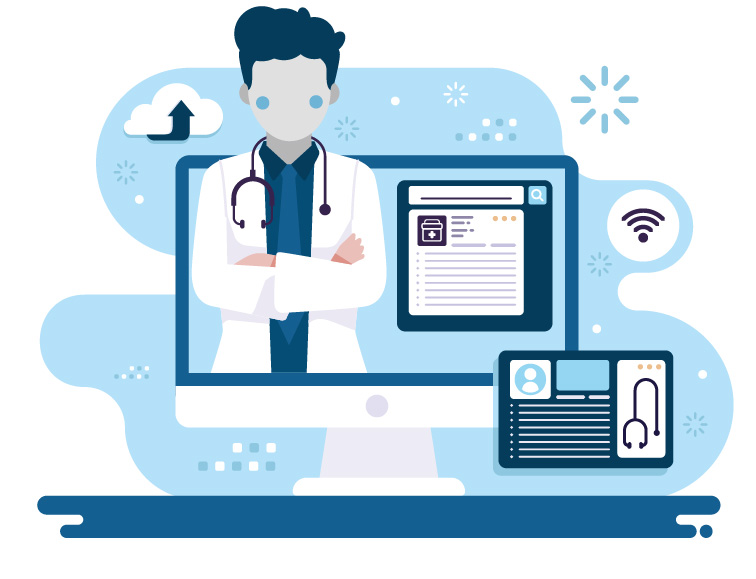Healthcare IT Solutions Expand with Rapid Digitalization Trend

In the healthcare sector, where change is the only constant, innovations and improvements in the healthcare IT are enhancing patient care and safety while reducing medical errors. Some of the ongoing developments in the industry can be closely tied with the promising landscape across medical technology.
Precision medicine, which involves customizing patient care to specific patient needs, has been one of the biggest buzzwords in healthcare in recent years. With the increasing complexity of precision medicine data, health IT solutions need to continuously evolve in order to interpret, integrate and deliver this data.
Healthcare stakeholders must enhance and address IT data and infrastructure to achieve precision medicine, the Office of the National Coordinator for Health IT (ONC) mentioned in a recent blog post in April 2021.
In wake of the global COVID-19 pandemic, tech adoption soared throughout 2020 as hospitals, patients and other health systems increasingly relied on digitalization and medtech solutions for care delivery. The next few years are bound to witness similar trends along with continued growth and innovation as the industry expands and prepares for future challenges.
Current Trends in EHR Implementation
The role of electronic health records (EHR) in healthcare is becoming more prominent as patient information becomes digital and an increasing number of patients demand mobile access to their health records. The 2020 statistics from Definitive Healthcare show that more than 89% of U.S. hospitals have implemented an inpatient or ambulatory EHR system.
Healthcare players are aware of the fact that the significance of EHR will only grow in the coming years, which is why development in the space is surging worldwide.
In January 2021, for instance, Ohio-based Adena Health System announced plans to implement the Epic EHR system developed by Epis Systems Corp. Adena also expanded its partnership with the Ohio State University Wexner Medical Center to connect with new partners in the state and leverage the medical center’s health IT expertise and resources to further optimize the EHR platform, enabling advanced patient care.
During April 2021, the U.S. Department of Defense, in collaboration with its partners, announced that it had completed the implementation of the MHS GENESIS EHR platform in 12 states and 25 military healthcare facilities.
With more than 41,000 active users, the EHR platform is now active across nearly 600 military healthcare facilities in the West and Midwest. EHR technology has completely revolutionized the way patient records are entered, stored and processed.
The future of EHR holds a lot of promise, allowing physicians and medical facilities to deliver superior patient care with the help of digital technologies. Back in 2019, the EHR segment held a considerable share of the healthcare IT industry in terms of revenue and the trend shows no signs of stopping in the near future.
mHealth: Advanced Technology for Improved Healthcare
mHealth solutions span smart medical devices, applications, analytics and aggregation platforms. As the popularity of mHealth skyrockets, mobile apps and connected medical devices are fast becoming part of mainstream healthcare. The medtech sector is a key application area for mHealth solutions as well.
The Healthcare Information and Management Systems Society (HIMSS) reports that nearly 64% of U.S. adults have a mobile app to track health metrics. The most popular mHealth apps in use today include diet and calorie counters, weight monitors, exercise and fitness trackers, blood sugar and blood pressure tools, sleep monitoring apps, medication management, and menstrual cycle trackers.
HIMSS data also shows that a lot more doctors are utilizing mHealth solutions to collect data and monitor it remotely, integrate patient data into EHR, keep in touch with patients, and conduct telemedicine visits. These trends aptly underscore how mHealth is emerging as one of the most disruptive technologies in the healthcare IT industry. mHealth tools are constantly evolving to include new features that can help identify some of the most critical medical conditions.
For instance, the mHealth app developed by a group of researchers at the Penn State University and Houston Methodist Hospital can detect signs of stroke through speech and facial movements. The AI-based mHealth application is as accurate in identifying symptoms of stroke as an ER doctor using a CT scan.
As the significance of mHealth technology grows, the industry is witnessing new initiatives and investments towards development of new, more powerful applications.
Recently, Innovate UK, a UK funding body, announced that it would sponsor my mHealth Limited, an NHS-approved digital therapeutics firm, to develop the new myHeart application. The company, along with three European collaborators, have received a nearlyS$3 million Eurostars Grant for their innovative project CUOREMA, which aims to support cardia rehabilitation in Europe.
Currently mobile apps are used mainly in the realm preventive care, Within less than 10 years, it is expected that they will play a role in the treatment of many diseases. Such adoption could increase patient engagement, improved quality of care and reduce costs.
mHealth will play a key role in making health IT services and medtech solutions far more personalized while also providing physicians with a stronger foundation for decision making based on scientific evidence. MedTech leaders including Siemens Healthineers, Oracle Corporation, GE Healthcare, Cerner Corporation, McKesson Corporation, and Allscripts Healthcare are among the notable names in the healthcare IT industry. As patient needs advance and the precision medicine trend grows, stakeholders are set to witness constant new opportunities, and at the same time, new challenges.